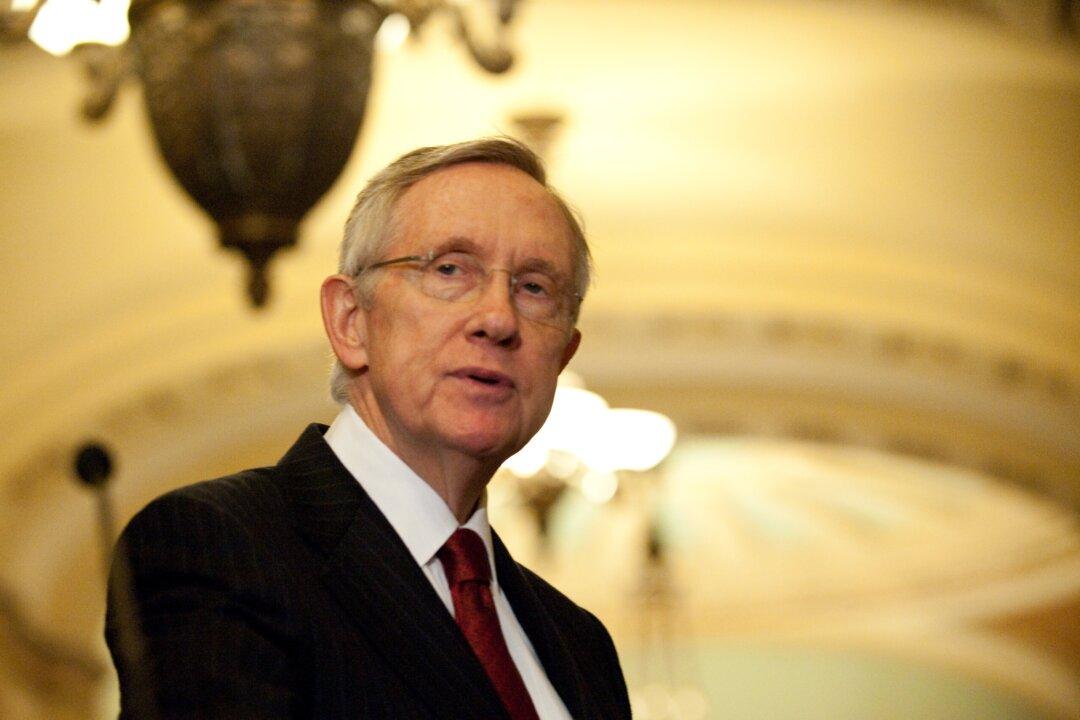WASHINGTON—Senate Majority Leader Harry Reid had a win when he reached a compromise with Senate Republicans on executive nominations last week. The new comity is likely be short-lived, however. A polarized Congress remains and important business, including major spending bills, promises further gridlock.
“The fundamental dynamic in the Senate has not changed,” said political scientist Dr. Peter Hanson from Denver University, “The two parties are far apart on key issues and will remain so.”
That divide had stopped the Senate from “getting things done,” said Reid in explaining his threat to change filibuster rules unless some agreement could be reached.
The Senate reached a record low for productivity last year, according to New York University’s Brennan Center for Justice, passing only 2.8 percent of the bills introduced, a 66 percent decrease from 2005-2006, and a 90 percent decrease from its high in 1955-1956.
Speaking at progressive think tank, the Center for American Progress, July 15, before the compromise was reached, Reid’s frustration was palpable.
Article Continues after the discussion. Vote and comment
[tok id=b2e3a12afce7d46a3960eb82beff8953 partner=1966]
“I love the Senate, but right now, the Senate is broken and needs to be fixed,” he said.
Obama has had 16 executive nominees filibustered, Reid said.
He described behavior in the Senate as “extreme,” and noted that Thomas Perez, Obama’s nominee for Secretary of Labor, was required to give written replies to 300 questions, and Gina McCarthy, the nominee for the Environmental Protection Agency, was expected to respond to 1,100 questions.
While Lyndon Johnson had one filibuster during an equivalent term as Senate majority leader, Reid said he had had around 420.
“This is a moment in history when circumstances dictate the need for change,” Reid said “It’s time for course correction that compels the two parties to work with each other instead of against each other.”
Filibuster rules
Reid had proposed changing filibuster rules on executive nominations. Filibusters allow the Senate minority to block executive nominations, judicial appointments or a measure, usually by extending debate. The strategy requires cloture to end a debate, which needs 60 of the 100 senators. Democratic senators presently number 52. Even with the support of two Independents, it’s impossible for them to invoke cloture without Republican support.
Reid’s proposal received considerable endorsement, many arguing that a president should be allowed to select his cabinet and suffer the consequences at the polls.
“Absent a major problem there is no good reason for the minority to block nominations,” Dr. Hanson said. But there is concern that once a rule is changed, it sets a precedent for other changes.
“If you change the rules it would make it more like the House,” Hanson said “The Senate may be more productive but it would lose what makes it distinctive.”
Senate Republicans were not prepared to run that risk, and in a deal brokered July 16, and with the help of Sen. John McCain (R-Ariz.) and Sen. Charles Schumer (D-NY), they reached a compromise: seven of Obama’s executive nominees would be approved provided that two appointments to the National Labor Relations Board were replaced and proposed changes to filibuster rules dropped.
By Friday, July 19 and after two years, the Senate had confirmed Roger Cordray as the permanent head of the Consumer Financial Protection Bureau, Gina McCarthy was confirmed as EPA chief, Thomas E. Perez as Labor secretary, and Fred Hochberg as the continuing head of the U.S. Export-Import Bank. Approval for nominees for the National Labor Relations Board was expected before senators break for the August recess.
Back to Business
Senate Republicans were not happy. Although Sen. Lindsey Graham (R-S.C.) had admitted that the filibuster had been used to protest an agency rather than the nominee, saying, “We were wrong,” others indicated that the strategy would continue as it was often the only way to get action from an agency.
“We are where we were before. Which is: It takes 60 votes,” said John Cornyn (R-Texas), according to Politico.
Sen. Rand Paul (R-Ky.) told Fox News that he would filibuster James Comey’s nomination as FBI director until he found out more about the drone program.
McCain said he will not support the nomination of Army Gen. Martin Dempsey as head of the Joint Chiefs of Staff until he receives more information on military plans in Syria.
A director for the Bureau of Alcohol, Tobacco, Firearms and Explosives is still in limbo after seven years. Obama’s nominee, B. Todd Jones, is the subject of debate in the Senate Judiciary Committee.
A replacement for Janet Napolitano as head of Homeland Security is also likely to be contentious. The position is closely tied to immigration legislation, which Obama is keen to pursue.
Polarization in the Senate is likely to add to the expected gridlock in Congress come September when spending bills for all major areas of government including defense and domestic agencies, must be decided before October 1.
Sen. Jim Risch(R-Ind.) said polarization in the Senate is only a reflection of the nation at large and until that is resolved the problems will continue.
“Until the country makes a decision which way they’re going to go, and … I mean by a cultural shift - I mean by a 60-40 - I think there’s going to continue to be polarization. There’s going to continue to be frustration in America,” he said on NPR.




